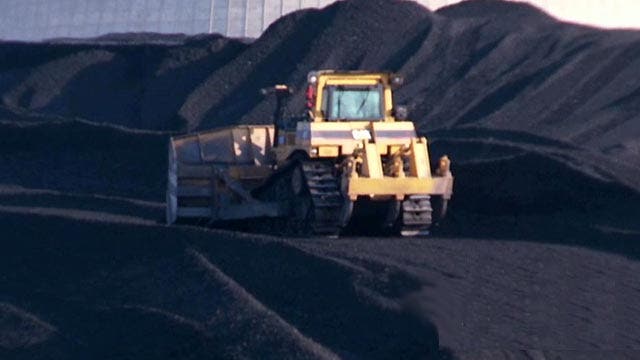New regulations threaten to bring coal industry to its knees
Doug McKelway reports from West Virginia
The next time you turn on a light, ride an elevator or charge up your cell phone, you might want to thank John Toth or 86,000 others like him still working today to dig the coal that fuels 40 percent of the electricity in the most productive nation ever.
Toth, a heavy-set West Virginian, toiled for over 25 years as a miner and a worker in other coal related industries. He bears the scars - short of breath and hard of hearing from loud machinery - but laments the demise of America's most abundant source of energy.
"My son makes his living by doing some contracting work in coal industry. I have a couple grandchildren, one going to West Virginia University to get a mining engineering degree. Hopefully the coal industry will be around," he says.
But the warning signs are ominous. On the far bank of the Ohio River, across from Moundsville, West Virginia where we interviewed Toth, sits the Burger Power plant.
Once a source of tremendous tax revenue for the Shady Side Ohio, it now sits idle, as do 130 others, or one-sixth of the coal-fired plants in the U.S. Most are victims of stringent new EPA regulations that sealed their fate.
The Obama administration has rejected accusations it has launched a "war on coal." But it presses ahead with yet more carbon regulation.
In a speech at Georgetown University on June 25, President Obama said, "I am directing the Environmental Protection Agency to put an end to the limitless dumping of carbon pollution from our power plants and complete new pollution standards for both new and existing power plants."
Those new "Source Performance Standards" to further limit greenhouse gases threaten the industry. The proposed rules provoked 23 coal-state members of Congress to sign a letter to Obama this week accusing him of "circumventing the will of Congress, which has repeatedly voted against carbon regulations."
Moundsville bears the effects of the EPA's enforcement. The town shows the tell-tale marks of unemployment, struggling businesses, and a lower tax base.
"The plants are assessed a fee, they're taxed on the value of the plant," says David Evans , a state delegate from Marshall County. He says local schools suffer from the precipitous plunge in tax revenues.
Phillip Remke owns a small medical supply store in Moundsville. His advice for anyone in the mining business? "Don’t buy any car, don’t put money down on houses or anything because these regulations coming in could be a big factor in our community. Our small towns that actually built this country will hurt desperately."
But even in the heart of coal country, opinions are changing. Mindy Spaar, whose father worked in the mines, said over lunch in a downtown cafe, "I believe the EPA needs more enforcement, I believe that our resources are being ruined around here, and we're producing more coal than we ever have."
Indeed, U.S. exports of coal are increasing dramatically, doubling from 60 million tons a year at the start of the Obama administration, to 120 million tons today.
That statistic is rich with irony. Regulations are forcing the retirement of domestic plants, while exports of U.S. coal are fueling America’s competitors, like China, who often burn U.S. coal without the pollution controls required here.
But U.S. exports, too, may be threatened.
The export terminals where coal is put on ships are permitted by the Army Corps of Engineers, not by the EPA. Environmentalists are putting tremendous pressure on the Obama administration to limit exports. If successful, it may ultimately mean the end of the fuel that powered America.











































